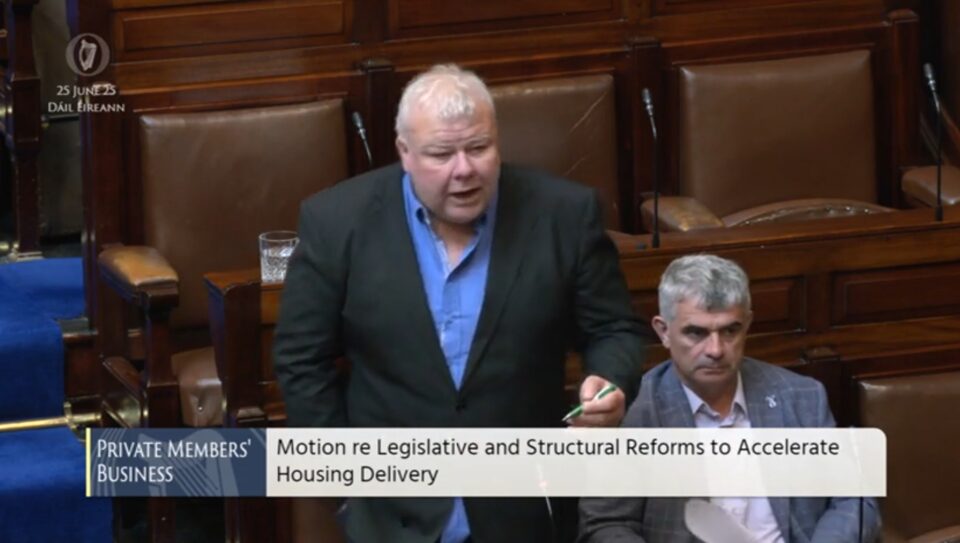In this article we cover changes to ROI planning legislation under the Planning Bill as published on the 26th January 2023:
- How the new planning bill will change zoning maps
- Enhanced powers given to central government with Ministerial Guidelines
- Outline of rural housing policy
- New compulsory purchase orders (CPOs) and how they’ll work
- Change to the appeals board: new name, new decision making process, statutory timelines
- Timeline with October 2023 update
The Draft Planning and Development Bill 2022 is expected to be enacted this summer, paving the way for new rules governing county and local development plans.
The Department of Housing says that the bill, if enacted in the summer as expected, will “bring greater clarity, consistency and certainty to how planning decisions are made”.
The aim is to make “the planning system more coherent and user-friendly for the public and planning practitioners”. Here’s how it will affect self-builders.
New development plans
Each local authority will now have to provide a greater level of detail on their zoning maps, so that residents, communities and prospective developers are clear as to which areas are earmarked for what type of development exactly.
All areas with a population of 1,500 or more at the last census will require a detailed settlement map. As will settlements with a population of less than 1,500, where the planning authority considers that the settlement concerned has the capacity to accommodate significant growth relative to the scale of the settlement.
Local Development Plans will be extended from six years to ten years, with a review midway through. They will give a strong sense of what is being planned for particular areas before any planning applications emerge.

Ministerial Guidelines will also become mandatory. An example of such a guidelines are the 2005 Rural Housing Planning Guidelines, which are currently under review.
The Department of Housing saying these guidelines will be given “strengthened legal status”. This enhanced legal grounding in the proposed planning bill will help the courts make judgments when planning cases are presented to them. Currently, the planning act is not clear enough for judges to make decisive rulings.
Even though local authorities will be expected to abide to ministerial orders but will retain discretion on matters specific to the area.
In addition to greater clarity at the Local Development Plan level, County Development Plans will also have to follow a set format with six strategic strands.
To achieve a coherent planning policy across all local authorities, it appears the Office of the Planning Regulator (OPR) will have a stronger rule in direct local authorities as to what should and shouldn’t be included in their plans based on the National Planning Framework and other national planning policies.
Under the planning bill, if a local or county development plans contravenes national planning policy, the OPR can direct the local authority to make changes, then the Minister can issue an order, and if not abided to the case goes the courts. The Minister can also issue a direct “urgent direction”.
The proposed legislation states that the OPR will need to be consulted three months before the development plans undergo review.
Rural housing
The local authorities will include a housing delivery strategy as part of their local development plans. According to the planning bill, the housing delivery strategy “identifies the spatial capacity of urban and rural locations to accommodate planned population and prioritises infrastructural investment necessary for housing development”.
The planners in local authorise will be in charge of “regulating and controlling the design, colour and materials of structures and groups of structures, including in particular streets and townscapes, and structures and groups of structures in rural areas”.
The county development plans will have to include “a statement of measures to prioritise compact urban development sites for residential use or a mixture of residential and other uses”, apparently giving priority to development around towns as opposed to the open countryside.
In making or varying a development plan, “a planning authority shall have regard to the development plans of adjoining planning authorities and shall, as far as practicable, coordinate the objectives in the development plan with the objectives in the plans of those authorities”.
The Minister can order the local authorities to do this and will be the arbitrator in the case of a dispute. The minister can ask the courts to enforce that order. County development plans have not always abided to planning policy.
New Compulsory Purchase Orders
Local authorities will be given the enhanced authority to issue Compulsory Purchase Orders (CPOs) to buy vacant or derelict properties to develop for residential use themselves or to sell to homebuyers. The CPOs have to go through the new Planning Commission (formerly An Bord Pleanála) for approval.
“The most sustainable home is the one already built and I believe this is a key element of the new planning legislation,” said Minister of State with responsibility for Heritage and Electoral Reform Malcolm Noonan at the publication of the Planning Bill today (26th January 2023).
According to the draft legislation, a local authority may, “for the purposes of performing any of its functions, as it considers appropriate acquire relevant property, permanently or temporarily, by agreement or compulsorily” and “extinguish, restrict or otherwise interfere with, permanently or temporarily, by agreement or compulsorily, relevant interests”.
Changes to appeals board

The planning appeals board An Bord Pleanála (ABP) will have to make decisions on the planning appeals it receives within a statutory timeline. Local authorities are already bound by legislation to make a decision on planning applications within in a set timeframe.
What that timeframe for the appeals board will be hasn’t been determined, but there will be a sliding scale with simple appeals like ones relating to one-off houses being the quickest.
Transition arrangements will give the board a chance to meet the new deadlines. ABP currently works to targets but is not bound by legislation to make decisions within a specific timeframe.
“Significantly, we are introducing a range of statutory timelines across the consenting processes, including for An Bord Pleanála for the first time,” said the ROI Minister for Housing, Local Government and Heritage, Darragh O’Brien.
“These will enhance confidence, transparency and consistency within the system. In line with this, timelines will also be included for the various steps in the Judicial Review process, including for pleadings, hearing of cases and delivery of judgements by the court. This too will give greater certainty for all involved in the Judicial Review process.”
The appeals board is also getting a new governance structure and a fresh name. It will be An Coimisiún Pleanála or the Planning Commission. There has been controversy surrounding ABP’s decision making and the new governance structure is expected to remove the influence of the board over decision making.
The Planning Bill is the product of a 15 month review of the planning system led by the Office of the Attorney General. The move is part of Housing for All, the government’s housing plan to 2030, which promised to deliver a comprehensive review and consolidation of planning legislation.
“In developing this legislation, the Government has been mindful of ensuring that public participation is safeguarded within our planning system and that members of the public can more clearly navigate planning legislation,” said Minister O’Brien. “This legislation will improve its accessibility and encourage the wider public to engage in the plan-making processes of their local towns and cities.”
UPDATE October 2023
An overhaul of the planning system in ROI has been approved by cabinet and is making its way through the Oireachtas.
Minister for Housing Darragh O’Brien said that while the target had been for the legislation to be passed before the end of the year, it may not be until 2024 that it is.
All County Development Plans will now be valid for 10 years, with a review at the five year mark. Currently timeframes vary from local authority to authority and policies across jurisdictions aren’t consistent.
There will also be a significant restructuring of An Bord Pleanála, with the body to be renamed An Coimisiún Pleanála, and mandatory timelines for decision making to be introduced. The aim is to speed up decision making and get projects off the ground more quickly.
The government’s guide to the bill is available here with more analysis here.



















